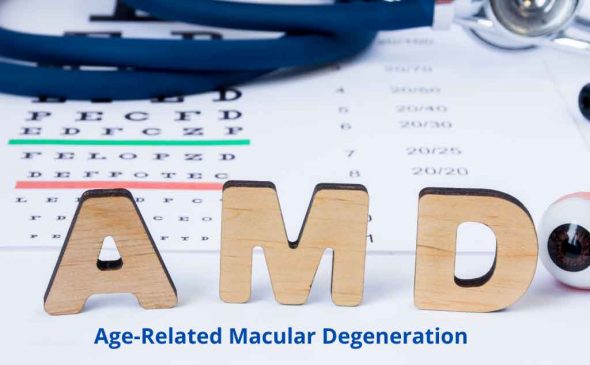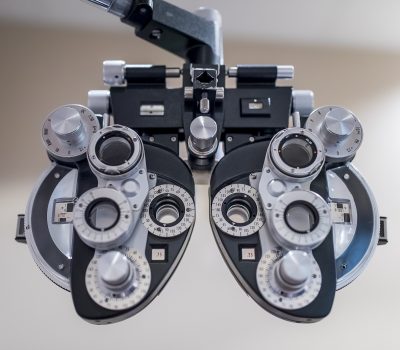What is Macular Degeneration and How Can it be Treated?

According to the Australian Institute of Health and Welfare, it is estimated that over 240,000 people in Australia suffer from macular degeneration. Also known as age-related macular degeneration (AMD), this is a group of degenerative eye diseases that severely impacts on vision and can, if untreated, lead to legal blindness. In Australia, the month of May is designated as Macular Degeneration Awareness Month.
What are the symptoms of macular degeneration?
Age-related Macular Degeneration most commonly affects people who are aged over 50. Macular degeneration affects eyesight in a number of ways. There will usually be a progressive deterioration in your sight which manifests as dark patches in the centre of your vision, while leaving peripheral vision unaffected. This impacts on your ability to perform tasks that require fine vision, including reading, and can also make it difficult to see clearly when driving. The disease can also mean that you have difficulty in recognizing faces, and straight lines may appear as being bent or wavy.
What causes macular degeneration?
Genetic, lifestyle and environmental factors can all contribute to the onset of macular degeneration. Age is one of the most common factors in development of age-related macular degeneration (AMD), with people over the age of 50 being most at risk.
There is also a hereditary risk of AMD, which means that if your parents or siblings have AMD, then you are at increased risk of having the condition too. People who smoke are also more susceptible to developing the disease.
Macular degeneration occurs in stages, each of which has its own underlying physiological causes and symptoms:
Early and intermediate stage
In its initial stage, macular degeneration in caused by a build up of waste material (known as drusen) that progressively accumulates under the retina. During the early stages, there may be no symptoms, although in some cases you might begin to notice a slight deterioration in the clarity of your central vision. This is the best time to see your eye specialist in Adelaide.
As the disease develops into the intermediate stage, the degree to which it impacts on each eye may be different. It is important that you consult an ophthalmologist in Adelaide, if you notice any change in your vision, to decide on need for intervention, that may help prevent any impending loss of vision.
Late stage
This is the stage where AMD will start to impact on the clarity of your vision and, potentially, on your overall quality of life.
Macular degeneration can also be divided into two types:
Dry (Atrophic) macular degeneration
In this type, the retinal cells gradually begjn to atrophy, and this leads to severe impairment of your central vision. Around a third of people with late stage macular deterioration experience this.
Wet (NeoVascular) macular degeneration
This is the more aggressive form of the disease. At this stage, fragile blood vessels form and then leak blood and fluid, both under and within the retina. The loss of vision associated with this type can be sudden and rapid. On some occasions it may affect only one eye, meaning that the condition goes unnoticed. This is why regular testing by an eye specialist is recommended, especially for people aged over 50.
Can macular deterioration be prevented?
There are steps that you can take that will reduce the risk of developing macular deterioration.
Eat well
Maintaining a healthy diet is important, and so you should aim to eat fish two or three times a week, along with dark green leafy vegetables and fruit every day, supplemented by a serving of nuts once a week. Research has shown that proper nutrition can be crucial in stopping the development of macular degeneration.
Stay fit
Staying as fit and healthy as possible may prevent or slow down the onset of the disease, as well as have a positive impact on your overall health and quality of life.
Stop smoking
Smoking can be a significant contributing factor to the development of macular degeneration, and so anyone who is looking to maintain good eye health should stop smoking. In addition, research has shown that people who may be genetically predisposed to AMD will develop the disease up to ten years earlier if they are smokers.
Protect yourself from the sun
Ophthalmologists recommend protecting your eyes as far as possible from UV light as a means of preventing or slowing down the onset of macular degeneration. Sunglasses or transition lenses, along with wearing a hat whenever you are outside, are helpful ways of doing this.
How is macular degeneration treated?
Early detection is essential in the treatment of macular degeneration, which is why it is strongly recommended that you have an eye examination with your Ophthalmologist regularly — at least every two years if you are over 50 years of age, or every year once you reach the age of 65.
It is also important to understand that while AMD is associated with getting older, it is not an inevitable consequence of ageing, and so you should always seek professional advice if you notice any deterioration in your sight.
Treating wet macular degeneration
If you are suffering from wet macular degeneration, the treatment will not cure the disease, but will instead aim to maintain your vision for as long as possible at its current level.
The procedure may include drugs that block certain proteins (known as anti-VEGF) being injected into the eye, usually on a monthly basis (this will be determined by your ophthalmologist), and which will generally need to be continued for a few years. Injections can usually be administered in your eye specialist’s consulting rooms (although is some instances the procedure may need to be done in a day surgery facility). In addition, you will also be required to monitor your vision every day using an Amsler Grid, a simple tool whereby you can check the health and quality of vision in each eye.
Other possible treatments available for wet macular degeneration include photodynamic therapy (PDT) and laser photocoagulation.
Photodynamic therapy combines a light-activated drug called Visudyne and light from a cool laser. The laser is directed at the affected area of the retina in order to slow down the growth and development of abnormal blood vessels. This procedure stabilities the vision (although there may be some delay before the benefits can be seen) and means the disease does not ultimately lead to significant vision loss.
Laser photocoagulation is generally used to treat patients in whom new fragile blood vessels are developing but which are not under the retina (a relatively uncommon occurrence). The procedure involves a concentrated beam of thermal light being directed at the retina that seals any new, leaking blood vessels before they can develop further.
Treating dry macular degeneration
There are currently no treatments available for patients with dry macular degeneration, although research into this condition is continuing. Therefore, healthy diet and lifestyle choices are recommended to slowdown the disease progress (as outlined above), along with regular examination by your Ophthalmologist. The latter is especially important as changes in your eye heath and vision need to be recognised as soon as possible, and early intervention can be crucial in preventing severe loss of sight.
Talk to your Ophthalmologist to find out more about macular degeneration
Dr Swati Sinkar is one of the leading eye specialists in Adelaide who provides high quality services across Adelaide and Adelaide suburbs at a various clinics, such as Eyemedics (Wayville), Kingswood Eye Centre and Salisbury Eye Clinic.
If you are concerned that you may be developing macular degeneration or AMD or want to arrange a checkup of your overall eye health, you will first need a referral from your GP. Once you have this, you can then arrange an appointment directly with any of the clinics at which Dr Sinkar consults (your GP or optometrist may do this on your behalf), or you can email to find out more.



